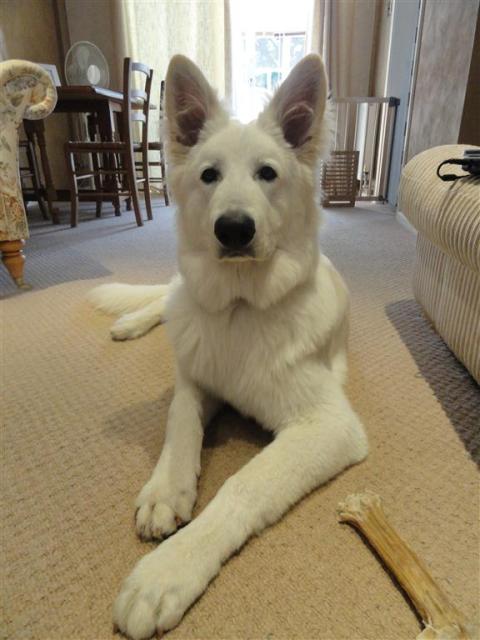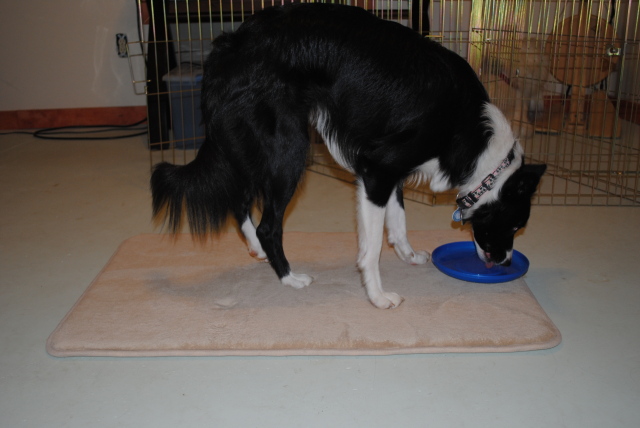QuestionHello Rita -
I am adopting a standard poodle that has not had a great past. She spent her first 16 months in a crate with very little human interaction. She was adopted by a breeder who felt sorry for her and thought she could add her to her breeding program. The dog never did bond with the new owner and her family - although there are many other dogs and not very much time for close interaction.
I'm now going to adopt this dog as a pet (not breeding). Apparently she's a happy dog, just "aloof" with humans - doesn't really seek out love from people. She also "freezes" when she is out of her element or scared - for example, at the vet's. I hope that I can give her the time and training she needs to be more socialized and to develop the essential human/dog bond that she has been missing out on.
I might have bitten off more than I can chew, but her current owner thinks it will work and I really want to help this poodle. She's just turned 2, so I think she's still young enough.
My question is ... when I bring her home next week, should I keep her by my side as much as possible - for example, with an umbilical leash so that we are together whenever I'm home? Or since she gets frightened out of her element - should I just let her have time to get use to the situation and warm up to me? I just want to get off on the right foot asap.
At first I thought that if we were leashed together as much as possible, she would bond with me quicker - and learn this is just how it is at this house. However, after reading some about shy/nervous dogs, I'm now worried that this tactic will make her more frightened. On the other hand, the last owner is still waiting for her to warm up completely - and hasn't done it in the 8 months she owned her (granted that person bred her, had 5 other dogs at home, and even more kids, works full time, and - well - is just plain busy all the time).
Advice?
AnswerHello Kim. You obviously have given this decision a good deal of thought, and I'm glad to see that you have considered the potential problems in adopting a dog with issues. As a general rule, my advice to people is to avoid adopting such a dog. It's unfortunate, but the types of socialization issues you describe can be very difficult to overcome and new owners have a tendency to fall into a trap of overcompensating for the dog's difficult history. However, it sounds like your mind is made up, so I will give you my best advice under the circumstances. First of all, I do not advise any forced behaviors. Do not keep the leash on her or insist that she remain by your side. This will only make her aversion tendencies worsen. Get her a crate and keep it covered so that the door is the only opening--you want her to have a safe dark sanctuary where she can retreat and decompress. Encourage her to use the crate by tossing a treat into it and saying, Kennel up! Let her get the treat and come right out again. Do this frequently so that she begins to see the crate as a good place to be, not a place of punishment or prolonged confienment. Do not overload her with attention and love when you bring her home. Too much of that sort of stimulation is going to confuse her--let her be the one to initiate contact with you. Do things to attract her interest without calling her directly to you--bounce a ball, fill a Kong with treats and roll it on the floor, toss a squeak toy in the air. You want her to WANT to be with you, so make yourself interesting, fun, and non-threatening. Do not approach her head-on, but from the side. Tell friends to wait for her to come to them when they come to your house--they should ignore her as much as possible but toss her a treat if she comes up to them of her own volition. If you can, enroll her in an obedience class but explain to the trainer that your goal is socialization more than learning the commands (that can come later). She should be in a controlled place with other dogs and people where YOU are in charge. She needs to see that she can rely on you in a stressful situation. Don't allow anyone to pet her--especially children. Just work in the corner of the room, take her outside for frequent breaks, and gradually let her see that the world is not out to get her. If she observes that the other dogs are having fun and are unafraid, she may begin to let her guard down and become interested in joining in the fun. Most importantly is to have a vet check her out thoroughly to rule out any medical conditions which may be contributing to this behavior. You will have your work cut out for you with this dog and there is no guarantee that you will be able to turn things around. Keep things as low-key as possible and give her space to relax and trust you on her own terms and timeframe. Any attempt to insist on a particular response is just going to exacerbate the problem. I wish you both good luck.

 Barking at strangers
Question
Kupe
We have a 7 month old (not neutered) male
Barking at strangers
Question
Kupe
We have a 7 month old (not neutered) male
 Dog Training And Punishment?
Question
Maya
hi there i have an akita X husky,
Dog Training And Punishment?
Question
Maya
hi there i have an akita X husky,
 Dog jumps on counters, Refrigerator,cabinet tops when Im not home
Question
Bell
Hello,
I dont even know where to
Dog jumps on counters, Refrigerator,cabinet tops when Im not home
Question
Bell
Hello,
I dont even know where to
 Peeing on edge of training pad
QuestionI have a 3 year old Poodle who has been house t
Peeing on edge of training pad
QuestionI have a 3 year old Poodle who has been house t
 Puppy Yelping
QuestionQUESTION: Hi! I have a 6 month old Cocker
Puppy Yelping
QuestionQUESTION: Hi! I have a 6 month old Cocker